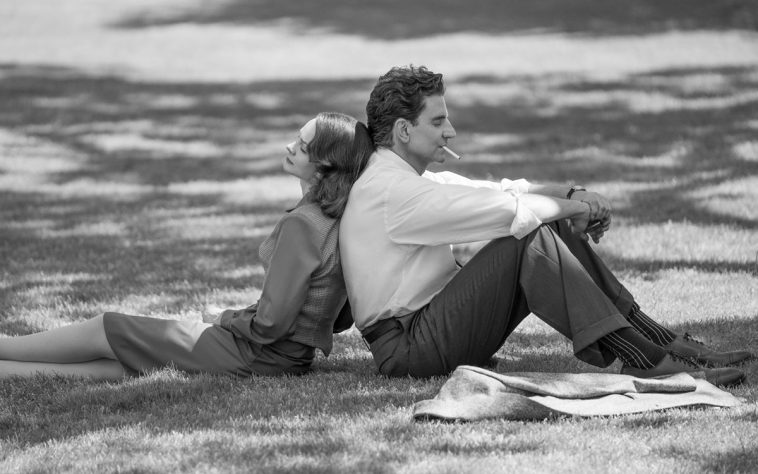It’s hard to think of a modern celebrity who holds an equivalent place in popular culture to the one held in his day by Leonard Bernstein – the subject of Bradley Cooper’s ambitious biopic “Maestro,” now in theaters ahead of a Dec. 20 drop on producing studio Netflix’s streaming platform.
A “highbrow” musical prodigy who gained mainstream celebrity after a spectacular debut as a substitute conductor for the New York Philharmonic, he forged a path as an orchestral leader and composer of masterpieces across a range of genres, from symphonies to film scores to Broadway musicals. Youthful, erudite, passionate, and handsome, he brought classical musical education to the masses via popular television broadcasts, becoming identified with the sophisticated culture of intellectual humanism epitomized by the hopeful “Camelot” of the Kennedy era.
Of course, the Bernstein known to the public in those heady days was not the real Bernstein – or not all of him, anyway – and the story behind the scenes is part of what Cooper, who not only directed and stars in “Maestro,” but co-wrote the screenplay with Oscar-winner Josh Singer (“Spotlight”), aims to illuminate. Picking up the narrative in the early days of its subject’s fame, it conveys the essence of his professional career in broad strokes, but concerns itself mostly with his private life. More specifically, it focuses on his marriage to actress Felicia Montealegre (Carey Mulligan), whom we meet as she enters his life in the wake of his sudden success. There’s a definite chemistry – but there’s also Bernstein’s involvement with musician David Oppenheim (Matt Bomer), with whom he shares both an apartment and a bed.
Nevertheless, and with full knowledge of what they’re getting into, the two eventually marry; through specific episodes in their life, it tracks the inevitable ups and downs – from the soul-mate joy of their special intimacy to the strain imposed on their bond by a parade of male companions brought into the household across the decades – to present a portrait of an unorthodox marriage between two unorthodox people whose bond ultimately transcends conventional notions of love, sexuality, and commitment.
That doesn’t mean things don’t get messy, however, and it must be admitted that the last third of the movie devolves a bit into domestic melodrama tinged with a touch of histrionics, and then threatens to go full tearjerker, to boot. But then, so does life, sometimes, and “Maestro” brings enough compassion, insight, and authenticity to the complex emotions at play that it is able to go deep, in the end, for the save.
Indeed, some of this melodramatic flair might be a function of Cooper’s stylistic approach, which blends fact, fantasy, and flights of fancy – such as a surrealistic “dream ballet” sequence inspired by “On the Town” (Bernstein’s first Broadway hit), as well as shifting from black-and-white to color and presenting much of the movie in an old-fashioned 1:33 aspect ratio – to form a sort of impressionistic view of Bernstein’s life. The elegant flamboyance of the film’s visual and narrative style flows naturally from the lavish mid-century aesthetic that informed the cinema that sprung from the cultural movement of which he was a part; and as for the man himself, his florid conducting style, to say nothing of the sweeping and dissonant passion of his compositions, were ample evidence that he would never be averse to tugging at a few heartstrings before building to a “wow” finale, so allowing a little indulgent sentimentality to assert itself along the way seems perfectly apropos.
At the same time, there is little about Cooper’s performance in the title role that could be called sentimental, or indulgent for that matter, despite the obvious license to “chew the scenery” when playing a flamboyantly bigger-than-life figure like Bernstein. Executed with a clear attention to detail and a fully invested personal connection to the character, Cooper’s portrayal expertly captures his intelligence and charm, as well as a remarkable level of chameleonic mimicry – enhanced by a dazzling physical transformation from makeup designer Kazu Hiro – that never once feels like “showboating,” and wins us completely with an unvarnished candor in depicting his less noble qualities.
Perhaps most impressive (especially in a biopic), at neither end of the “moral” spectrum does it ever feel as the actor is bringing any judgment to the role, only observation. It’s a titanic performance, even without the reenactments of Bernstein’s conducting prowess, which honors the legendary composer simply by rendering him as a flawed, if exceptional, human being.
Yet as superb as his work might be, and despite “Maestro” being ostensibly about Bernstein himself, the movie’s star turn comes from Mulligan, whose top-billed performance as Montealegre is employed as the story’s emotional core. It’s her journey, from bold best friend to supportive muse to estranged “ex” and back again, that give the film its meat. She takes it from start to finish without a misstep, and in the process almost makes Cooper’s Bernstein a foil in his own movie. It’s a testament to his own artistic integrity that he allows, even amplifies, every opportunity for her to do it.
For queer audiences, of course, it might be a disappointment that the movie chooses to center itself on Bernstein’s heterosexual marriage instead of exploring any of his now-well-known same-sex affairs – little time or development is spent on any of those relationships, not even with Oppenheim. Still, it makes no effort to hide or downplay his sexual identity; indeed, it is at the center of the conflict which drives the entire film, and it reflects with compassionate honesty the reality of living as a queer person in a time and culture in which one’s queerness must be kept hidden as a matter of simple survival. What emerges instead of a cold dissection of a fraudulent “marriage of convenience is an idea of love that exists beyond the constraints of sexuality or gender – and that lifts “Maestro” above such moralistic notions, allowing it to celebrate the commitment between two people willing to live beyond them, even when things get tough.
The film is loaded with memorable performances from others, too; in particular, Bomer – especially powerful in the scene where he is introduced to the woman he already knows will take his lover away from him – reminds us how good he can be when afforded material that stretches him beyond his pretty-boy looks, and comedian Sarah Silverman has some rich moments as Bernstein’s sister, Shirley. So too, it is distinguished by a comprehensively detailed production design, which traces the evolving look and feel of the era it covers in succinctly evocative detail, delivered through outstanding cinematography by Matthew Libatique. In the end, however, it is Bernstein’s music itself that stands as the key element in capturing the irrepressible passion – the “singing of summer” inside him – that made him an incomparable artist and informed his life as a whole.
In the end, that’s what Cooper’s movie wants us to take away, more
than any insights into its subject’s musical genius or the difficulties
of navigating a divergent sex life among consenting adults in a time
where such things were beyond taboo: the importance of embracing and
expressing our lives to the fullest, whether by creating art or simply
experiencing the raw truth of our existence in the moment, for better or
for worse, in all its contradictory, beautiful glory. The Bernstein it
shows us is, like all of us, impossible to define in a single quality;
rather it strives to depict a life made whole and complete through the
interplay of myriad conflicting passions.
“Maestro” might be a
big, glossy biopic that – on the surface, at least – sometimes falls
into familiar tropes, but it’s worldly and wise enough to get that right, which is enough to elevate it above at least 90 percent of other films in its genre.


